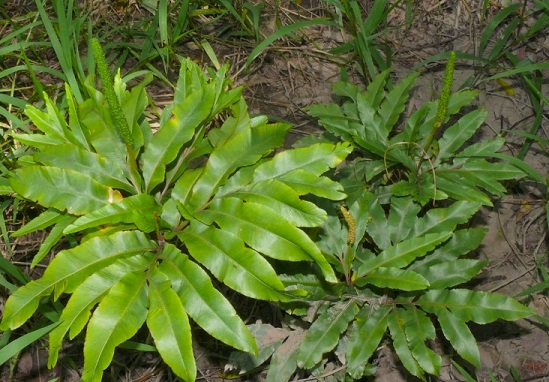Breakthrough Phytochemical Compound Could Transform Pulmonary Fibrosis Treatment
Nikhil Prasad Fact checked by:Thailand Medical News Team Jun 19, 2025 8 months, 4 days, 19 hours, 19 minutes ago
Thailand Medical News: Scientists Discover Ugonin L from Traditional Herb That Halts Lung Scarring
A groundbreaking new study from a team of Taiwanese scientists has found that a natural compound called Ugonin L, extracted from a traditional medicinal plant, can significantly reduce the progression of pulmonary fibrosis—a deadly and incurable lung disease affecting millions worldwide.
 Breakthrough Phytochemical Compound Ugonin-L from the Helminthostachys Zeylanica
Breakthrough Phytochemical Compound Ugonin-L from the Helminthostachys Zeylanica
Plant Could Transform Pulmonary Fibrosis Treatment
Pulmonary fibrosis causes scarring of the lung tissues, making it increasingly difficult for patients to breathe. Most cases are classified as idiopathic pulmonary fibrosis (IPF), with unknown cause but often linked to aging, infections, and environmental exposures. With limited treatment options currently available and only two FDA-approved drugs that merely slow disease progression without offering a cure, researchers are urgently searching for better solutions. This
Thailand Medical News report highlights a promising new direction.
The study was conducted by scientists from National Yang Ming Chiao Tung University, National Tsing Hua University, National Research Institute of Chinese Medicine (Ministry of Health and Welfare), Taipei Medical University, National Chiayi University, National Chung Hsing University, and Taichung Veterans General Hospital—all in Taiwan. Their research focused on a compound known as Ugonin L, derived from Helminthostachys zeylanica, a plant commonly used in traditional medicine across Asia.
A Powerful New Weapon Against Lung Scarring
In carefully designed laboratory and animal studies, the researchers showed that Ugonin L not only improved survival rates in mice with chemically induced lung fibrosis but also significantly reduced visible lung damage. In treated mice, lung tissue appeared healthier, body weight was preserved, and scarring and inflammation were dramatically reduced.
When studied in human lung cells, Ugonin L demonstrated its strength by blocking cell migration and reducing the production of fibrotic markers like collagen and α-SMA—two key indicators of lung scarring. It also calmed inflammatory responses by lowering levels of harmful cytokines such as TGF-β1, IL-1β, IL-6, and TNF-α in lung fluids.
Mechanism Unveiled—Targeting the Fibrosis Pathway
Ugonin L works through a powerful double-action mechanism. First, it blocks the activity of TGF-β receptors (TβRI and TβRII), which play a central role in driving lung fibrosis. The team showed that Ugonin L binds directly to the ATP-binding sites of these receptors, disrupting downstream signaling that would normally activate scarring responses.
Second, the compound also promotes autophagy—a natural process cells use to clean up and recycle damaged components.. In fibrotic lu
ngs and activated lung fibroblasts, Ugonin L boosted autophagy-related proteins like Beclin-1 and LC3B, while reducing harmful buildup of fibrotic proteins. This not only halted disease progression but also began reversing established damage.
Outperforms Approved Drugs in Key Areas
Interestingly, the antifibrotic activity of Ugonin L compared favorably with pirfenidone, one of the currently approved IPF drugs. Unlike pirfenidone, which has undefined mechanisms and moderate effects, Ugonin L showed clear, targeted action by suppressing both the canonical (SMAD2/3) and non-canonical (ERK1/2 and PI3K/Akt/mTOR) fibrosis pathways.
Further testing confirmed its safety—Ugonin L had no toxic effects on liver or kidney function in the mice. And in cells, it did not harm normal lung fibroblasts at therapeutic doses.
Conclusion—Nature Provides a New Hope for Lung Disease
This new study shines a light on the immense therapeutic potential of Ugonin L as a novel and effective treatment for pulmonary fibrosis. By targeting the disease at its roots—blocking key fibrosis signaling and enhancing the body’s own cleanup system—it offers a far more powerful approach than current drugs. With strong evidence from both animal and human cell models, Ugonin L now stands out as a leading candidate for future clinical trials.
While more studies are needed to evaluate long-term safety, optimal dosing, and effectiveness in human patients, the results so far are highly encouraging. If future trials confirm these findings, this natural compound could transform how pulmonary fibrosis is treated—offering new hope to millions worldwide.
The study findings were published in the peer reviewed journal: Biomedicine and Pharmacotherapy
https://www.sciencedirect.com/science/article/pii/S0753332225004615
For the latest on Herbs and Phytochemical, keep on logging to
Thailand Medical News.
Read Also:
https://www.thailandmedical.news/news/hidden-lung-damage-in-millions-post-covid-may-be-permanent-and-irreversible
https://www.thailandmedical.news/news/45-percent-of-all-hospitalized-for-covid-19-pneumonia-will-show-signs-of-fibrosis-six-months-later
https://www.thailandmedical.news/news/favipiravir-that-was-used-to-treat-covid-19-actually-causes-lung-inflammation-lung-damage-and-lung-fibrosis
